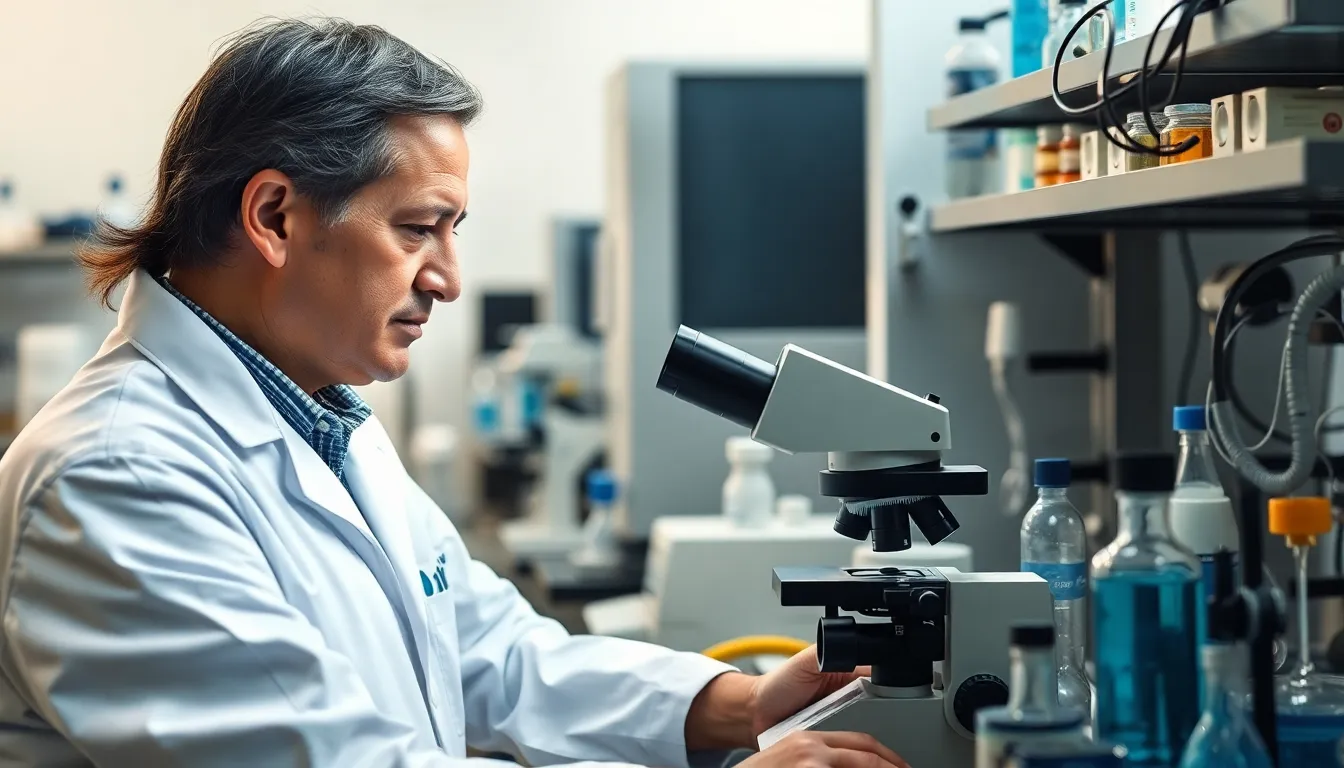Biotechnology is transforming the way we approach health, agriculture, and environmental sustainability. With rapid advancements in genetic engineering, synthetic biology, and biomanufacturing, it’s reshaping industries and improving lives. These innovations not only enhance crop yields and disease resistance but also pave the way for groundbreaking medical therapies.
As scientists and researchers continue to unlock the potential of biological systems, the possibilities seem limitless. From CRISPR technology revolutionizing gene editing to personalized medicine tailoring treatments to individual patients, biotechnology stands at the forefront of modern science. Understanding these advancements is crucial as they hold the key to addressing some of the world’s most pressing challenges.
Table of Contents
ToggleOverview of Biotechnology Advancements
Biotechnology advancements play a crucial role in various sectors, driving innovation and efficiency. Key areas of focus include genetic engineering, synthetic biology, and biomanufacturing, each offering unique benefits.
Genetic Engineering
Genetic engineering allows precise modifications in organisms. Scientists utilize techniques like CRISPR to edit genes, enhancing crop resilience against pests and diseases. This technology also aids in developing therapeutics tailored to individual genetic profiles, significantly improving treatment outcomes.
Synthetic Biology
Synthetic biology combines biology and engineering principles. It enables the creation of new biological parts and systems. Applications include biofuels produced from engineered microorganisms and biosensors for detecting environmental pollutants. These innovations support sustainable practices and reduce dependency on fossil fuels.
Biomanufacturing
Biomanufacturing leverages living cells to produce materials and products. It replaces traditional manufacturing processes, leading to lower emissions and less waste. Industries are utilizing biomanufacturing for pharmaceuticals, resulting in cost-effective and environmentally friendly production methods.
Medical Innovations
Advancements in biotechnology, such as personalized medicine, enhance treatment efficacy. Patient-specific therapies target diseases based on genetic data, resulting in higher success rates. Immunotherapy, a product of biotechnology, reprograms the immune system to fight cancer more effectively.
Agricultural Transformations
Biotechnology improves agriculture through genetically modified organisms (GMOs) that yield more food with fewer resources. Drought-resistant crops conserve water and reduce agricultural pressure on resources. Innovations in biofortification enhance nutritional quality, combating malnutrition and food insecurity.
Environmental Biotechnology
Environmental biotechnology focuses on solutions for waste management and pollution control. Bioremediation uses microorganisms to clean contaminated environments. This approach reduces toxic substances in soil and water, promoting ecosystem health.
These advancements are reshaping industries and responding to global challenges. Understanding these developments provides insights into future innovations and their potential impact on society.
Recent Breakthroughs in Genetic Engineering

Recent advancements in genetic engineering are driving innovation across various fields. Technologies like CRISPR have revolutionized gene editing, while gene therapy is transforming treatment options for genetic disorders.
CRISPR Technology
CRISPR technology allows for precise and efficient modification of DNA. This revolutionary tool uses a guide RNA to target specific sequences within the genome, enabling researchers to insert, delete, or alter genes with unmatched accuracy. In agriculture, CRISPR has been applied to develop crops with enhanced drought tolerance, pest resistance, and improved nutritional profiles. In medicine, studies show CRISPR’s potential to target genetic diseases at their source, such as sickle cell anemia and muscular dystrophy, significantly reducing or eliminating disease symptoms. Clinical trials are currently underway, demonstrating the capacity of CRISPR to provide tailored solutions for previously untreatable genetic conditions.
Gene Therapy Innovations
Gene therapy innovations focus on correcting defective genes responsible for disease development. Recent breakthroughs include viral vector technology that safely delivers therapeutic genes into patients’ cells. Notable examples include therapies for hereditary blindness, spinal muscular atrophy, and certain types of cancer, which have shown promising results in restoring functionality or halting disease progression. Techniques like base editing and prime editing offer improved approaches, minimizing unintended genetic changes. Regulatory approvals for various gene therapies reflect their efficacy and safety, paving the way for widespread application in personalized medicine. These advancements not only enhance treatment possibilities but also highlight the role of genetics in future healthcare solutions.
Applications of Biotechnology in Medicine
Biotechnology significantly impacts medicine by facilitating personalized treatments and enhancing vaccine development. These applications demonstrate its potential to revolutionize healthcare.
Personalized Medicine
Personalized medicine leverages biotechnology to tailor treatments based on an individual’s genetic profile. Genetic testing identifies specific mutations linked to diseases, allowing healthcare providers to select targeted therapies. For example, treatments for cancers like breast and lung utilize biomarkers to determine the most effective drugs. Recent advancements in pharmacogenomics support the development of drugs that match a patient’s genetic makeup, resulting in improved efficacy and reduced side effects. This approach fosters significant advancements in chronic disease management, offering solutions that address the unique genetic predispositions of diverse populations.
Vaccine Development
Vaccine development benefits from biotechnology through methods like recombinant DNA technology and mRNA platforms. These techniques enable the rapid design and production of vaccines, enhancing responsiveness to emerging infectious diseases. For instance, the COVID-19 mRNA vaccine demonstrated how biotechnological approaches can create effective immunizations in record time. Recombinant vaccines, such as those for hepatitis B and human papillomavirus, utilize genetically engineered proteins to stimulate immune responses without using live pathogens. This innovation leads to safer vaccines with minimal adverse effects while improving accessibility and distribution efficiency globally, addressing public health challenges more effectively.
Biotechnology Advancements in Agriculture
Biotechnology has significantly transformed agriculture, enhancing food production, resilience, and sustainability. Key techniques, including genetic modification and innovative farming practices, contribute to addressing global food security challenges.
Genetically Modified Organisms (GMOs)
Genetically modified organisms (GMOs) represent one of the most notable advancements in agricultural biotechnology. GMOs are engineered to exhibit specific traits, such as resistance to pests, diseases, and herbicides. For instance, Bt cotton and Bt corn are genetically engineered to produce toxins harmful to pests, reducing reliance on chemical pesticides.
GMOs also enhance crop yields by improving drought resistance, offering stability in food supply during climate variability. According to the Food and Agriculture Organization (FAO), the adoption of GMOs can increase crop productivity by up to 20% under adverse conditions. Additionally, biofortified crops, such as Golden Rice, are enhanced with essential nutrients like vitamin A, addressing malnutrition issues in vulnerable populations.
Sustainable Farming Practices
Sustainable farming practices leverage biotechnology to promote environmentally friendly agriculture. Techniques like precision agriculture utilize biotechnology to optimize inputs, reducing waste and minimizing environmental impact. For example, soil sensors can provide real-time data, guiding irrigation and nutrient application, enhancing efficiency while conserving resources.
Also, integrated pest management (IPM) combines biological pest control with biotechnology to reduce chemical pesticide use. Using GMOs with built-in pest resistance can significantly decrease the need for chemical interventions, fostering healthier ecosystems.
Biotechnology also plays a role in developing biofuels from crop residues, utilizing plant material to create renewable energy sources and mitigate reliance on fossil fuels. Thus, sustainable practices not only boost agricultural productivity but also promote ecological balance and resource conservation.
Future Trends in Biotechnology
Emerging trends in biotechnology promise to shape industries and improve societal health. Key areas of focus include advanced gene editing, enhanced biomanufacturing, and the integration of artificial intelligence.
- Gene Editing Innovations: CRISPR technology continues to evolve, offering new possibilities for precise genetic modifications. Projects that explore base editing and prime editing expand the scope of gene therapy, targeting genetic disorders with higher accuracy and fewer off-target effects.
- Biomanufacturing Techniques: Sustainable production methods evolve, incorporating synthetic biology to create bio-based materials. Developments in cell-free biomanufacturing enhance efficiency while reducing waste, aligning with green chemistry principles.
- Artificial Intelligence Applications: AI and machine learning are revolutionizing data analysis in biotechnology. Predictive models streamline drug discovery processes, accelerating the development of personalized medicine and optimizing agricultural practices.
- Microbiome Research: Researchers are delving deeper into microbiomes, recognizing their role in health, nutrition, and environmental resilience. Innovations in microbiome engineering facilitate improved gut health products and sustainable agricultural practices.
- Nanobiotechnology: This field is gaining traction, enhancing drug delivery systems and diagnostic capabilities. Nanoparticles fine-tune the targeting of therapeutic agents, maximizing efficacy while minimizing side effects.
- Regenerative Medicine: Advancements in stem cell research and tissue engineering enable the regeneration of damaged tissues and organs. These innovations present potential treatments for degenerative diseases and injuries, opening new avenues in healthcare.
- Sustainable Agriculture Practices: Precision agriculture, powered by biotechnology, optimizes crop management using real-time data. Integrating satellite imagery and IoT technologies fosters efficient resource use and minimizes environmental impacts.
These trends collectively point toward a transformative future for biotechnology, with the potential to address key challenges in health, agriculture, and sustainability. Each advancement contributes to a robust landscape of possibilities that enhance life quality and environmental stewardship.
Biotechnology is at the forefront of addressing global challenges and enhancing quality of life. With innovations like CRISPR and personalized medicine, it’s clear that the potential for improving health outcomes and agricultural sustainability is immense. As researchers continue to explore the capabilities of synthetic biology and advanced gene editing, the promise of more efficient and environmentally friendly solutions becomes increasingly attainable.
The integration of artificial intelligence and advancements in regenerative medicine further paves the way for groundbreaking discoveries. Embracing these advancements will not only drive progress in various sectors but also foster a healthier planet for future generations. The future of biotechnology holds great promise, and its impact will be felt across the globe.


